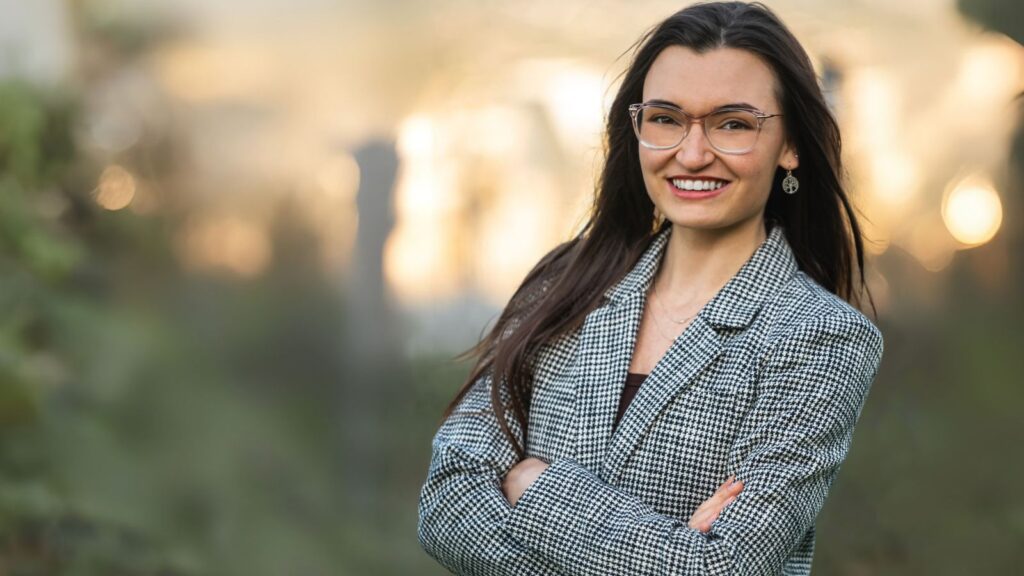ND-MSCR student and Research Week organizer focuses on chronic conditions and improving mental health.

With the National University of Natural Medicine (NUNM) gearing up to host Research Week from May 12-16, we’re shining a spotlight on our student researchers.
Danielle ZuZero, a dual-degree student in the Doctor of Naturopathic Medicine and Master of Science in Clinical Research programs at the National University of Natural Medicine (NUNM) focuses on chronic conditions and their impact on both mental health and quality of life.
ZuZero has a special interest in craniosacral therapy, an area that combines both her passion for research and medicine, and says her ultimate goal is to expand the role of evidence-based research to help build trust and awareness in the field.
Danielle ZuZero ’25
Program: Doctor of Naturopathic Medicine (ND); Master of Science in Clinical Research (MSCR)
Hometown: Kalispell, Montana
What are your research interests?
My interest is in the management of chronic conditions using naturopathic approaches, highlighting the importance of mental health and quality of life, in addition to disease markers. I’m curious about the subtle precursors to chronic illness, such as a history of trauma and suppressed emotions, and how they might contribute to disease manifestation. This passion was sparked when a family member was diagnosed with rheumatoid arthritis (RA) and I witnessed it alter their entire life, virtually untouched by the current treatment options.
During my undergraduate studies at Portland State University, I was accepted into the BUILD EXITO research mentorship program, where I began my journey into the world of research with their ongoing support and encouragement. Here, I followed my interest in RA working on a project set to improve communication and goal-setting skills between rheumatologists and their patients to support better health outcomes. (1)
At NUNM, I’ve also worked as a research assistant studying the connection between mindfulness and chronic back pain with sciatica. (2)
What research are you working on now?
Right now, I’m working as a research assistant to investigate an enzyme supplement (Zypan) for individuals with functional dyspepsia, or ongoing stomach pain. While this project is outside of my primary area of interest, I thoroughly enjoy the work and plan to stay on to help with the analysis.
I’m also conducting my MSCR thesis on how craniosacral therapy is used for chronic pain, using a cross-sectional survey of practitioners across the U.S. and its territories. If you talk to someone who’s received craniosacral therapy, they’ll likely tell you how much it has changed their world. However, current research is limited and doesn’t quite reflect that yet. My goal is to build a foundation of evidence that shows how craniosacral is being used in the context of chronic pain, what mental health outcomes are being observed, and how research can support its mission with minimal harm and maximum benefit to the community. This work can help guide future studies and strengthen the field for years to come.
When it comes to combining my passion for research and medicine, this truly feels like my lane, as I also serve as president of the NUNM Craniosacral Club, working closely with Dr. Anna Peterson. As a student and advocate of the practice, I believe I can honor the magic of this medicine while providing objective data points and high-quality evidence that can build trust and awareness. Oftentimes, data is minimized into a simple “a + b = c” formula, but that doesn’t quite represent the art of physical medicine in its whole form. My aim as a clinical researcher is to present findings in a nuanced, non-reductionist manner and foster credibility in a field often marked by skepticism. Ultimately, I hope to see craniosacral therapy covered by insurance, but only if its integrity and original principles remain uncompromised in clinical practice
Why is NUNM a good place to do research?
The fact that I could pursue the ND and MSCR degrees simultaneously is what sealed the deal to attend NUNM. What sets NUNM’s research program apart from others is the fact that research students have the opportunity to create their own thesis projects, as opposed to joining someone else’s.
At the Helfgott Research Institute, we have our own lab and research offices on site, which lends us to a broad scope of research capabilities and a greater sense of community. I wanted to foster this even more by creating NUNM’s first annual Research Week in 2024—an event where students can both present their work and meet professionals in the field, building a successful network to move into our careers.
This intention came to life as I met my thesis mentor (Dr. Nini Callan) through organizing this event, which is my hope for other students at future events! Recently, a group of us attended the ICIMH conference in Seattle, WA which was an enlightening experience, both professionally and personally, as we continued to foster our shared connection of being true research nerds and advocates for holistic wellbeing.
Research Sources:
Study with Dr. Jennifer Barton, in collaboration with OHSU/VA Portland Health Care System: Kahler J, ZuZero D, Ochoa D, et. al. Goal Concordant Patient-clinician Dyads Have Higher Odds of Communication Around Rheumatoid Arthritis Goals. American College of Rheumatology, 2023. (1)
Wexler RS, Fox DJ, ZuZero D, et al. Virtually delivered Mindfulness-Oriented Recovery Enhancement (MORE) reduces daily pain intensity in patients with lumbosacral radiculopathy: a randomized controlled trial. Pain Rep. 2024;9(2):e1132. Published 2024 Mar 14. doi:10.1097/PR9.0000000000001132 (2)